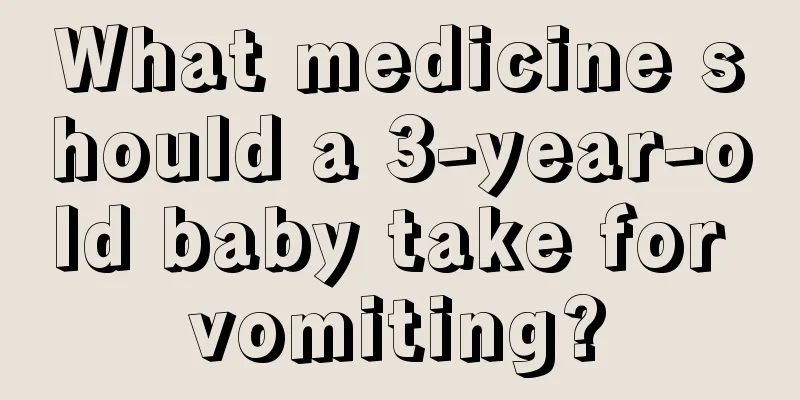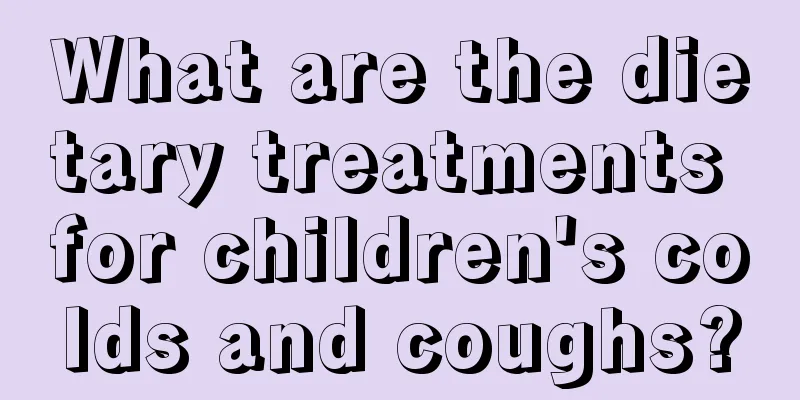What medicine should a 3-year-old baby take for vomiting?

|
For a 3-year-old baby, although the body is relatively well developed, the resistance is still relatively low. Many things need to be paid attention to in life, especially when the temperature changes with the seasons. Many babies will experience vomiting and other phenomena. There are many reasons for vomiting in babies. Parents should give the baby some targeted medicines according to the specific reasons. If parents are not sure about the cause of the baby's vomiting, they should take the baby to the hospital for examination. What medicine should a 3-year-old baby take for vomiting? Smecta Smecta combined with metoclopramide can effectively treat baby vomiting. If your baby is taking this medicine and vomiting due to a cold, do not eat for a short period of time. Dosage and Administration: Take one-third to one bag of Smecta at a time, 3 times a day. Sugar and salt water If the baby's vomiting is not too serious, you can feed him some sugar and salt water in small amounts and multiple times. The ratio is about one small spoonful of salt to one large cup of boiled water and about 2 spoons of sugar. Usage and Dosage: Add a teaspoon of salt and 2 teaspoons of sugar to a large cup of boiled water. oral. Domperidone Because the baby's digestive system is not yet mature, medications should be used with caution. When the baby suffers from vomiting and indigestion due to cold, gastrointestinal motility drugs or gastrointestinal mucosal protective agents can be given. Dosage and Administration: Take 0.3 mg per kilogram of body weight, 3-4 times a day. oral. Precautions for baby medication 1. Choice of route of administration: The recommendation is “do not give intramuscular injections if the medication can be given orally, and do not give intravenous injections if the medication can be given intramuscularly”. Although the injection method provides accurate dosage, rapid onset of action, and is not affected by digestive juices, it also has its shortcomings. In addition to disinfection of the injection site, the quality of the drug, the irritation of the drug, the toxicity of the drug itself, particles and pyrogens in the infusion can all cause serious adverse reactions or even death. When the condition is not serious, please choose oral or intramuscular administration. When the condition is serious, choose intravenous administration. 2. The dosage should be accurate: The dosage for children must be calculated based on age or weight. Adverse drug reactions may occur if the dosage is large or the intravenous injection speed is too fast, which exceeds the child's ability to bear or tolerance. 3. The choice of medicine should be appropriate: Some important organs of children, such as the liver and kidneys, are not fully developed, liver enzyme secretion is insufficient or absent, and renal clearance function is poor. Therefore, the use of highly toxic drugs with serious adverse reactions should be avoided. 4. Babies should not take adult preparations: When giving medication to babies, choose children's dosage forms. Do not use adult-specification sugar-coated tablets, sustained-release tablets, controlled-release tablets, capsules, etc. Sugar-coated tablets and capsules can mask the bitter taste of the drug on the one hand and improve its bioavailability on the other. |
<<: Child vomiting and sleepiness
>>: What medicine should the baby take if he catches a cold and vomits?
Recommend
What should I do if my child has phlegm in his throat?
When children are young, they will always have on...
Can baby stomatitis heal itself?
Stomatitis is oral ulcer. If a child develops sto...
Does baby seborrheic dermatitis need treatment?
In our lives, babies are very delicate when they ...
Tips to prevent your baby from scratching his face
Many of a baby's behaviors are unconscious, s...
Seven situations in which parents should not kiss their babies
NO.1—Blisters appear If a mother develops rice-si...
What to do if your baby has a high fever due to bacterial infection
Bacteria are microorganisms that can penetrate an...
Clinical manifestations of Helicobacter pylori in children
There are many common diseases in children. When ...
Why does the child vomit after eating milk?
The birth of a baby makes the mother who has just...
Is it serious if a child has a fever and shivers?
It's already January, and although the temper...
Can children eat bayberry?
In order to have a balanced nutrition for childre...
How to treat congenital malformations in babies?
Everyone knows that pregnant women need to have r...
What to do if your 18-month-old baby is zinc deficient
Zinc is an essential element in the body, especia...
5 kinds of snacks may be the killer of children's IQ
5 kinds of snacks may be the killer of children&#...
What to do if your two-month-old baby has eczema on his face
Eczema is a condition that many babies have encou...
What should I do if my child has a severe dry cough?
Children due to low physical function. So it is v...









